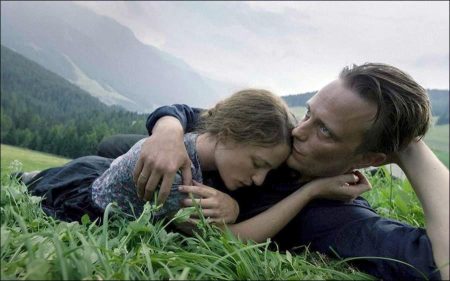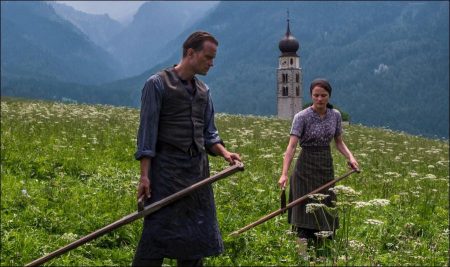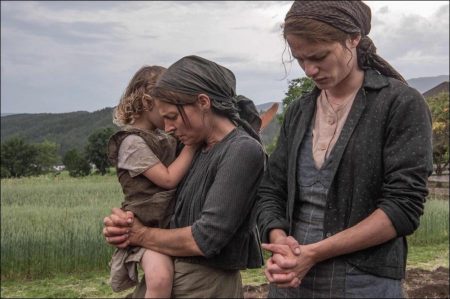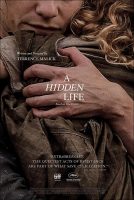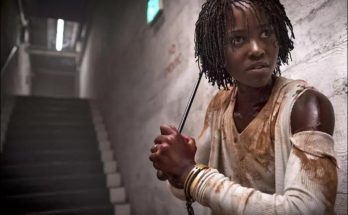A Hidden Life follows the real-life story of Austrian peasant farmer Franz Jägerstätter (August Diehl) who refuses to fight for the Nazis in World War II. Born and bred in the small village of St. Radegund, Jägerstätter is working his land when war breaks out. Married to Franziska (Fani) (Valerie Pachner), the couple are important members of the tight-knit rural community. They live a simple life with the passing years marked by the arrival of the couple’s three girls. Franz is called up to basic training and is away from his beloved wife and children for months.
Eventually, when France surrenders and it seems the war might end soon, he is sent back from training. With his mother and sister-in-law Resi, he and his wife farm the land and raise their children amid the mountains and valleys of upper Austria. As the war goes on, Jägerstätter and the other able-bodied men in the village are called up to fight. Their first requirement is to swear an oath of allegiance to Adolf Hitler and the 3rd Reich. Despite the pleas of his neighbors, Jägerstätter refuses. Wrestling with the knowledge that his decision will mean arrest and even death, Jägerstätter finds strength in Fani’s love and support.
Jägerstätter is taken to prison, first in Enns, then in Berlin and waits months for his trial. During his time in prison, he and Fani write letters to one another and give each other strength. Fani and their daughters are victims of growing hostility in the village over her husband’s decision not to fight. After months of brutal incarceration, his case goes to trial. He is found guilty and sentenced to death. Despite many opportunities to sign the oath of allegiance, Jägerstätter continues to stand up for his beliefs and is executed by the Third Reich in August 1943, while his wife and three daughters survive.
A Hidden Life is a 2019 historical drama film written and directed by Terrence Malick, starring August Diehl, Valerie Pachner, with both Michael Nyqvist and Bruno Ganz in their final performances. The film depicts the life of Franz Jägerstätter, an Austrian farmer and devout Catholic who refused to fight for the Nazis in World War II. The film had its world premiere at the Cannes Film Festival in May 2019 and will be theatrically released in the United States on December 13, 2019.
Fiim Review: A Hidden Life
Terrence Malick’s heartfelt and reverently high-minded new movie is inspired by a life that is little-known — hidden, perhaps. Franz Jägerstetter was an Austrian conscientious objector during the second world war who made a personal stand for his anti-Nazi beliefs by refusing to take the Hitler oath as a Wehrmacht conscript and in 1943 was duly executed.
August Diehl (who played the lead in Raoul Peck’s The Young Karl Marx) is Jägerstetter; Valerie Pachner is his wife Franziska, and there are cameos from Matthias Schoenarts as Jägerstetter’s defence lawyer and the late Bruno Ganz as the military tribunal president who sorrowingly questions Jägerstetter about what he sees as the stubbornness and futility of his beliefs before reluctantly passing the terrible sentence of death.
The title is taken from George Eliot’s Middlemarch: “The growing good of the world is partly dependent on unhistoric acts; and that things are not so ill with you and me as they might have been, is half owing to the number who lived faithfully a hidden life, and rest in unvisited tombs.” Modest though he was, Jägerstetter’s own tomb is not in fact entirely unvisited, as Pope Benedict XVI beatified him in 2007, perhaps partly in contrition for the Church’s failure to oppose the Nazis.
The style that Malick has found for this subject is very much the same as ever: an overpowering sense of being ecstatically, epiphanically in the present moment, an ambient feeling of exaltation created by a montage of camera shots swooning, swooping and looming around the characters who appear often to be lost in thought, to an orchestral or organ accompaniment, and a murmured voiceover narration of the characters’ intimate but distinctly abstract feelings and memories. (One tic is not here, in fact: the camera shot directly into a distant sunset. Perhaps it felt too American.) When Malick uses black-and-white newsreel clips, it is momentarily disconcerting to be reminded of straightforwardly conventional cinematic grammar.
Deploying this rhetoric in the service of such an important subject would appear to make sense. Often it does make perfect sense (although Malick has of course made a movie about the second world before: The Thin Red Line in 1998, his adaptation of James Jones’s novel about the battle of Guadalcanal in the Pacific.) Malick’s visionary approach points up at first the pure happiness of the couple’s life together in the village of Radegund, and then it distils the agony of Jägerstetter’s qualms of conscience and his dark night of the soul as he decides to defy the Nazis, and then his loneliness and anguish in prison — and Franziska’s own loneliness left alone with the children, an outcast. Its religious quality is appropriate too, as Jägerstetter was a Catholic.
Yet the strange thing is that the nature of Franz’s intensity seems … well … not all that different from the intensity of Ryan Gosling’s thoughtful singer-songwriter in Malick’s Song to Song (2017), or Christian Bale’s tortured screenwriter in Knight of Cups (2015) or Ben Affleck’s engineer in To The Wonder (2014) whose woes are considerably less pressing — though their spiritual lives are undoubtedly important, and Malick is an film-maker very much concerned with the life of the spirit. It is as if Malick has taken Jägerstetter and enclosed him in exactly that same hermetically sealed environment of heightened awareness of the present moment, and unawareness of the larger context.
By creating one of his signature rhapsodies around this anti-Nazi figure, Malick has in a way marooned and islanded Jägerstetter, detaching him from much of the larger historical context — though one thing the film does reveal is that Jägerstetter was not as prominent a figure as, say, Sophie Scholl, because he did not actively campaign for and publicise his views: what he did was report for a second term of duty in the Wehrmacht (having already served uncontroversially up to the fall of France), refuse to give the oath, and then submit to being bundled away.
Yet Malick does succeed, to some degree, on his own terms; he attempts to give some (stylised) sense of this man’s inner life: his emotional and spiritual architecture. It is admirably serious but static.
A Hidden Life (2019)
Directed by: Terrence Malick
Starring: August Diehl, Valerie Pachner, Michael Nyqvist, Matthias Schoenaerts, Jürgen Prochnow, Bruno Ganz, Alexander Fehling, Ulrich Matthes, Karl Markovics, Franz Rogowski, Tobias Moretti
Screenplay by: Terrence Malick
Production Design by: Sebastian T. Krawinkel
Cinematography by: Jörg Widmer
Film Editing by: Rehman Nizar Ali, Joe Gleason, Sebastian Jones
Costume Design by: Lisy Christl
Set Decoration by: Yeşim Zolan
Art Direction by: Steve Summersgill, Bryce Tibbey
Music by: James Newton Howard
MPAA Rating: PG-13 for thematic material including violent images.
Distributed by: Fox Searchlight Pictures
Release Date: December 13, 2019
Views: 66
